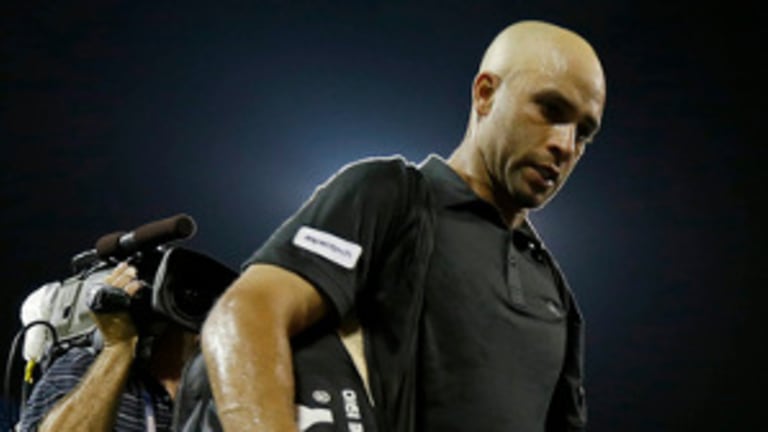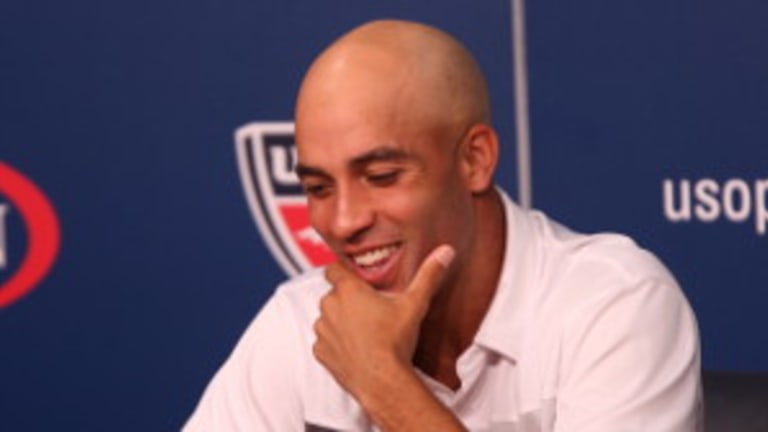NEW YORK—James Blake moved on from his life as a professional tennis player a little past midnight this morning, going out in a five-set loss to big-serving Ivo Karlovic on Louis Armstrong Stadium in the first-round of the 2013 US Open. (The retirement comes with an asterisk: He remains entered in the tournament’s doubles event.) It was an anticlimactic exit for the sentimental American favorite and former world No. 4: Afternoon rain played havoc with the schedule, and by the time the competitors took the court, what was billed as a “not before 5:30 match” didn’t begin until about 8:30 p.m. before a half-empty stadium.
Blake won the first two sets and seemed to have things well in hand over a strangely subdued Karlovic, but faltered in the third and fourth sets, surrendering them in an eventual 6-7 (2), 3-6, 6-4, 7-6 (2), 7-6 (2) defeat. Along the way, Blake’s supporters—present in his friends’ box and in the southeast spectator seating area—conjured ghosts of the J-Block with chants of “Here we go, James, here we go” and other chestnuts from seasons long gone.
Blake left the game the same way he came in—with no illusions. When he announced his imminent retirement on Monday he volunteered that he knew his career wouldn’t end at the Tennis Hall of Fame in Newport, Rhode Island. And he’s right: Almost shockingly, in hindsight, he never made it to the semifinals of a major, never won a Masters event, never became No. 1. And yet, James (you’ll forgive me for lapsing into first-name familiarity; I collaborated with him on his memoir *Breaking Back*) connected deeply with American tennis fans, despite his very good but less-than-stratospheric results. And, as he moves on to whatever’s next—he’s indicated it might be television commentary, or perhaps a future gig as Davis Cup captain—it’s worth taking a moment to consider and appreciate why.
One reason was that, accustomed to having an embarrassment of male champions—there was an unbroken line that went from John McEnroe and Jimmy Connors to Pete Sampras and Andre Agassi to Andy Roddick—American fans were perpetually hungry for the next one, and for a shining season or two, it seemed that Blake might be it.
But it was more than that, and something unique to Blake: Even before I met and worked with him, I believed that his appeal came from the fact that he seemed like the guy next door rather than an unapproachable, un-relatable athlete. That feeling spoke to fans’ ability to pick up on the genuinely ordinary life he led for his first two decades: He and his brother, Thomas, Jr., both played for their high school tennis team in Fairfield, Connecticut—then matriculated at Harvard University before turning pro.
James’ game was founded on an atomic forehand that was always fun to watch and his gentle off-court demeanor and humility always made it a little surprising when he uncorked it. He was the Clark Kent of tennis, the guy next door who possessed a secret superpower. (In two press conferences this week, Blake said that although he seemed naturally athletic, it was actually an illusion produced by hard work. His persona, then, was the product of his parents: His late father, Thomas, a stern and loving taskmaster who demanded 100 percent effort, and his soft-spoken mother, Betty, originally from England.)
Though his parents wanted badly for him to graduate from Harvard, by the end of his sophomore year he had become the number one college player in the country, and it was clear that his talents warranted a stab at the professional grind. He was already far, far behind the curve, having never attended one of the academies that had already become de rigueur for up-and-coming players. And so, promising his mother that he would one day return to Harvard to complete his undergraduate degree, he set out on the pro tour, starting with the Futures and Challenger circuits.
The odyssey that followed was something that many fans related to because Blake seemed like one of us, with one exception: He was average guy, but one who discovered, in dribs and drabs, that he had the kind of special gift that people usually only discover they have in the movies.

